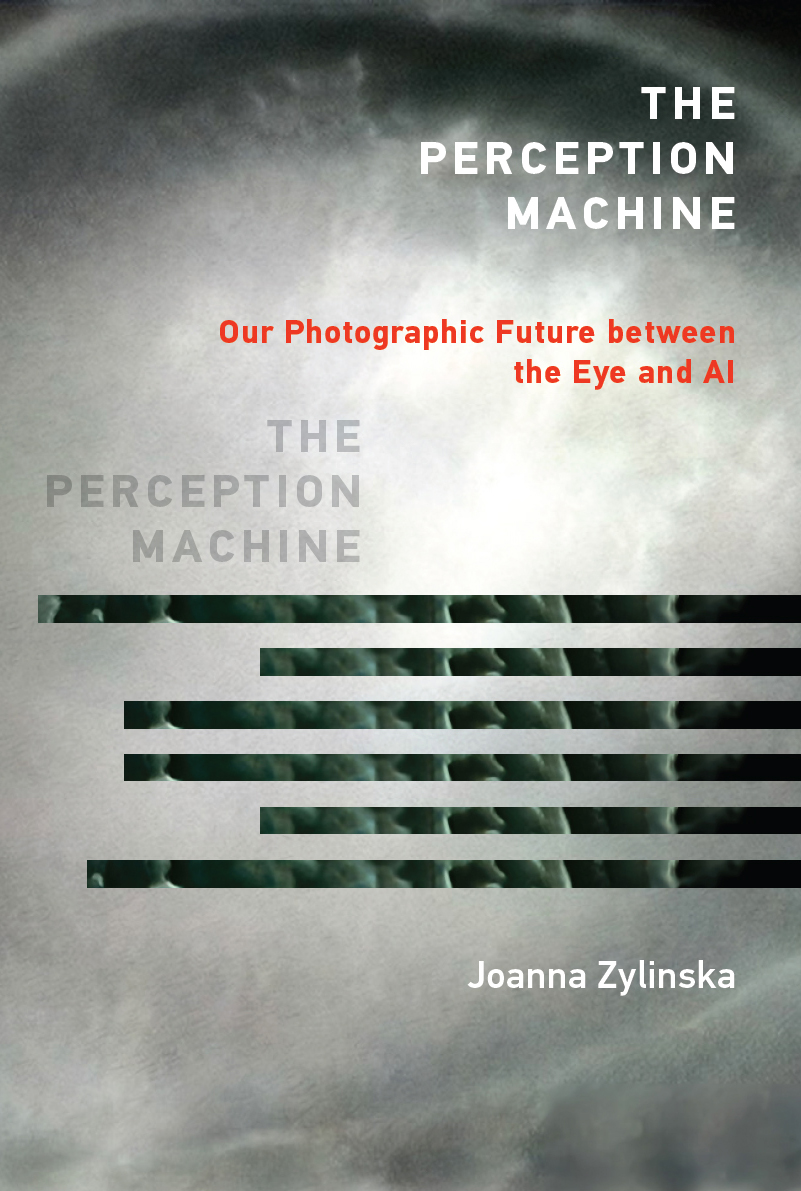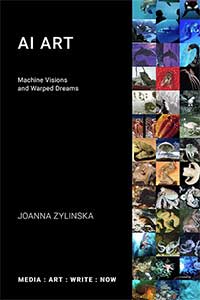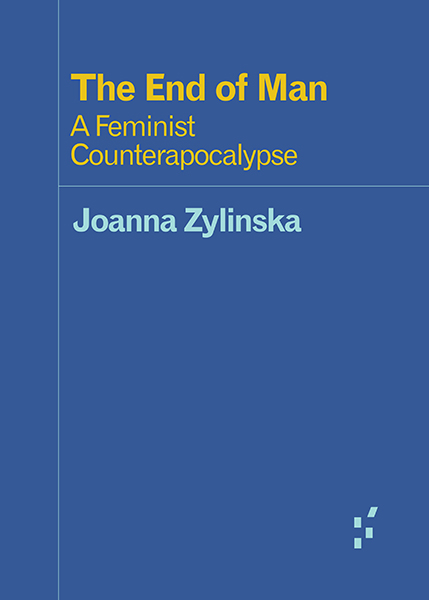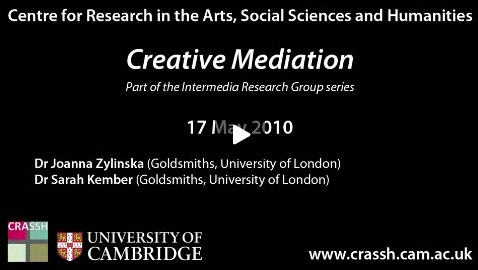VIDEOS AND PODCASTS
Many other recent recordings from 2020-2023 are available on the Talks page.
NONHUMAN CREATIVITY : ARTIFICIAL IMAGINATION : HUMAN ANTICIPATION. Talk the Digital Society Lab [DigLab] of the Institute for Philosophy and Social Theory, Belgrade, on 8 March 2023.
FEMINIST ECO-ECO-PUNK: A PRACTICAL GUIDE FOR MANAGING THE END OF THE WORLD. Keynote at the 11th European Feminist Research Conference. 15-18 June 2022, University of Milano-Bicocca, Milan, Italy.
AI ART: MACHINE VISIONS AND WARPED DREAMS. Podcast interview with Elese Dowden for the Australasian Posthumanities series.
BEYOND MACHINE VISION: HOW TO BUILD A NON-TRIVIAL PERCEPTION MACHINE. Keynote at the ‘Artificial Creativity’ conference, Malmö University, Sweden, 19-20.11.2020.
----------------------------
AESTHETICS OF NEW AI: Panel Discussion with Mercedes Bunz, Leif Weatherby, Nora Khan, Joanna Zylinska & Murad Khan, Creative AI Lab in collaboration with NYU Digital Theory H-Lab, Serpentine Galleries, 9.10.2020
----------------------------
AI ART: MACHINE VISIONS AND WARPED DREAMS. Keynote @ re:publica 2019
----------------------------
THE END OF MAN: SPECIES VULNERABILITY IN THE ANTHROPOCENE
----------------------------
ENCOUNTERING THE ANTHROPOCENE: GEOLOGY, CULTURE, ETHICS. A podcast-article by myself published in Westminster Papers in Communication and Culture. 12(1), pp.35–37.
What does the proclamation of the Anthropocene – an epoch in which the human is said to have become a geological agent and who’s had irreversible impact upon our planet (Kolbert, 2014; Klein, 2014) – mean for media and cultural studies? Reflecting on the crisis of human and nonhuman life as manifested in ongoing multispecies extinction, this contribution discusses how media and cultural studies can engage with the ‘geological turn’ (Ellsworth and Kruse, 2013). It also considers whether it makes sense to practice media and cultural studies from the perspective of deep, i.e. geological, time.
Zylinska argues that this ‘naturecultural’ mode of thinking can be traced back to Raymond Williams’s idea of culture as ‘transformation of substance at a biological level’ (1997). Yet the Anthropocene may open up media and cultural studies to new ways of engaging with nature and culture, by raising questions about issues of distribution, environment and the privileging of the human as the central point of ethics (Zylinska 2015). At the same time, in its attention to both matter and discourse, media and cultural studies can help rein in some of the rhetorical excesses of the Anthropocene debate. Through its hermeneutic tools, it can also challenge an uncritical and moralistic focus on materiality that ‘the geological turn’ at times implies.
----------------------------
CABLES, CAMERAS AND OTHER FOSSILS: MEDIA PASTS AND MEDIA FUTURES. Keynote address from ‘Mediating (Dis)Continuities: Contesting Pasts, Presents and Futures’: 6th European Communication Conference, organised under the auspices of European Communication Research and Education Association ECREA, Prague, 9-12.11.2016.
And here's a short interview about the keynote with with a student TV station at Charles University.
----------------------------
OPEN ACCESS WEEK 2016
Video interview, recorded at Goldsmiths for the Open Access Week. (Open Access Week, running from 24-30 October 2016, is a global annual event that promotes Open Access as the new default in scholarship and research.) The video contains a few general remarks about open access but mainly concentrates on the Open and Hybrid Publishing Pilot. It also includes many screenshots of the Photomediations book.
Open Access Week interview with Joanna Zylinska from Goldsmiths, University of London on Vimeo.
----------------------------
PHOTOGRAPHY AFTER THE HUMAN, OR HOW TO REIMAGINE THE ANTHROPOCENE, EXTINCTION AND THE ECO-ECO CRISIS WHILE THERE'S STILL TIME Presentation at 'After the Spectacular Image: Art, Architecture, and the Media of Climate Change', Environmental Humanities Symposium, Princeton Environmental Institute, Princeton University, February 2016. Joint panel with Professor Robin Kelsey (Harvard).
----------------------------
WHAT IS AN IMAGE WHEN THERE'S NO ONE TO SEE IT?: PHOTOGRAPHY AFTER THE HUMAN Keynote at the What Is an Image? conference, University of Copenhagen, 2015
----------------------------
OPEN ACCESS MONOGRAPHS AND PUBLISHING MODELS: Collaborative Ways Forward Panel discussion at Goldsmiths, University of London, on 19th October 2015 as part of International Open Access Week with Martin Eve, (Senior Lecturer in Literature, Technology and Publishing, Birkbeck, University of London), Alison Jones, (Managing Editor, Open Access, Oxford University Press) Sarah Kember, (Professor of New Technologies of Communications, Goldsmiths, University of London and Goldsmiths Press) Peter Mandler, (Professor of History at the University of Cambridge and President of the Royal Historical Society), Joanna Zylinska (Professor of Media and Communications, Goldsmiths, University of London and Radical Open Access Group)
Open Access Monographs and Publishing Models: Collaborative Ways Forward from Goldsmiths, University of London on Vimeo.
----------------------------
LIFE, DEATH AND EXTINCTION
MFA FINE ART AND MFA CURATING LECTURES 2015-2016, Goldsmiths, University of London, October 2015
----------------------------
PHOTOGRAPHY AFTER EXTINCTION
Center for 21st Century Studies "After Extinction" Conference, University of Wisconsin-Milwaukee. May 1, 2015.
------------------------------------------------------------------------------------------------------------------------
OPEN AND HYBRID PUBLISHING Plenary presentation at the E-Space conference, Venice, October 2014.
----------------------------
THE CREATIVE POWER OF NONHUMAN PHOTOGRAPHY
This is an illustrated talk from my visit to the School of Arts and Humanities, its Graduate Programme and the Research Group ‘Art Theories and Contemporary Media’, Universidad de las Américas Puebla, Mexico, in April 2014. The intros are in Spanish but the actual talk is in English (45 mins).
Conferencia Dra. Joanna Zylinska Capilla del Arte UDLAP from GI Más allá del texto UDLAP on Vimeo.
------------------------------------------------------------------------------------------------------------------------
This is a talk from my visit to the School of Arts and Humanities, its Graduate Programme and the Research Group ‘Art Theories and Contemporary Media’, Universidad de las Américas Puebla, Mexico, in April 2014. It develops further some of the ideas raised in my book, Bioethics in the Age of New Media, and my article, 'Bioethics Otherwise, or, How to Live with Machines, Humans, and Other Animals'.
Conferencia Dra. Joanna Zylinska UDLAP from GI Más allá del texto UDLAP on Vimeo.
------------------------------------------------------------------------------------------------------------------------
"What Can We Do with Crude Matter? The Golem Issue in AI, Art and Ethics"
Keynote talk at the Beyond the Artificial Intelligence conference at the University of Western Bohemia, Pilsen, November 2013
-----------------------------------------------------------------------------------------------------
Interview (in Spanish) for El Muro TV about the Transitio_MX festival (for which I served as Artistic Director)
--------------------------------------------------------------------------------------------------------------------------
 CREATIVE MEDIATION: Joanna Zylinska & Sarah Kember @ The Centre for Research in the Arts, Social Sciences and Humanities, University of Cambridge, 17.05.2010.
CREATIVE MEDIATION: Joanna Zylinska & Sarah Kember @ The Centre for Research in the Arts, Social Sciences and Humanities, University of Cambridge, 17.05.2010.





